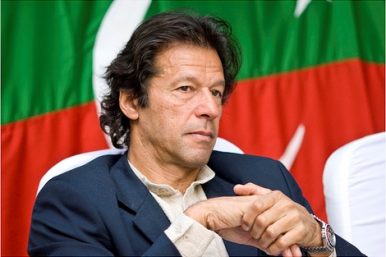
Image Credit: Flickr/ Jawad Zakariya
The strange logic behind Pakistan’s leaders wanting a Hindu nationalist party to keep control of India.

By Kunwar Khuldune ShahidApril 12, 2019
With the first phase of the Indian general elections underway, the ruling Bharatiya Janata Party (BJP) has received a vote of confidence from an unlikely source: Pakistan’s Prime Minister Imran Khan.
Talking to reporters this week, Khan said there is “better chance of peace” with India if the BJP wins the general elections.
The argument that Khan presented was that — unlike the Hindu nationalist BJP — the opposition Congress party might fear the right’s backlash over any Kashmir talks. However, there are multiple ways that the Pakistani premier’s comments can be interpreted.Enjoying this article? Click here to subscribe for full access. Just $5 a month.
Given that the BJP has repeatedly accused the Congress of “speaking Pakistan’s language,” Khan could be giving similar arsenal to the opposition, which they have duly used to accuse the BJP of “allying with Pakistan.” The argument that Khan is trying to subtly help the opposition would go with the official narrative of the ruling Pakistan Tehreek-e-Insaf (PTI), which has called out the BJP for its “anti-Muslim” alignment.
Notwithstanding an unlikely election bluff, though, there are reasons to believe that Khan genuinely meant what he said. That would signify the Pakistani government actually welcomes another BJP term – purely on the grounds of geopolitical realism, especially vis-à-vis Kashmir.
Where the right-wing BJP might not fear as much political backlash over Kashmir, the narrative of a “Hindu Rashtra” (Hindu state) in fact goes with the aspirations of the party’s hardliners and that of its radical parent organization Rashtriya Swayamsevak Sangh (RSS).
Jammu and Kashmir, the only Muslim-majority state in India, carries symbolic significance for the secular India that the Congress claims to espouse. Meanwhile, it is precisely this Muslim-majority identity of Kashmir that has been the foundation of Pakistan’s claim since 1947.
This has resulted in the tug of war between two ideas – one Islamic and the other secular – with both ideologues historically needing the territory as the final jigsaw piece.
Just like the BJP has been considered likelier to come to the table on Kashmir, a similar setup is needed across the border as well. In Pakistan’s case, Army rule has traditionally provided that setting, considering that military dictators have never had to worry about public sentiments.
It is no coincidence that the closest the two states have come to resolving the Kashmir issue was at the 2001 Agra Summit, where Pakistan was led by military ruler General Pervez Musharraf and India by the BJP’s Atal Behari Vajpayee.
With Imran Khan’s PTI in charge, owing in large part to the military establishment’s manipulation of last year’s elections, Pakistan practically has unhindered Army rule without any resistance from the civilian leadership. The military establishment is further rewarding Khan by helping fabricate a one-party system, working toward weakening the federation, and helping the PTI get rid of its opposition under the façade of accountability.
Khan’s complete alignment with the Pakistan Army can be seen in the nonchalance with which he acknowledges that the military created armed militias in the country or how he maintains that the state would “no longer” allow its soil to be used for terrorism, for which his predecessors have been dubbed “traitors” in the past.
While some might interpret this as an early sign that Khan wants to break free from the Army’s stranglehold, the Pakistani prime minister is actually echoing the official narrative of the military.
The so called Bajwa doctrine, named after the current Army chief, Qamar Javed Bajwa, is touted as messianic, because it ostensibly acknowledges military’s past mistakes – including fostering of jihadist militia – and erects a bulwark against another formal coup in the country.
Given that Pakistan’s support for jihadist groups has been the primary bone of contention for India, is the state’s crackdown on militias then a signal of intent to finally make peace with India? Is the Pakistani establishment rooting for the BJP so that the two countries can finally resolve Kashmir?
Quite the contrary.
The Pakistani establishment needs BJP rule in India to justify its ongoing mainstreaming of jihadist groups into national politics. Where the crackdown on these groups comes under Chinese pressure, with Beijing fearing for its record investment in the China-Pakistan Economic Corridor, the establishment sees the orchestration of the political rise of Kashmir-bound jihadists as a counterbalance of the RSS’s ascent in New Delhi – and would look to present it as such in the international arena as well.
With Pakistan seeking to internationalize Kashmir issue in the same way as Afghanistan – Islamabad has sought to hyphenate Kashmir with Palestine to gain global mileage – the establishment’s next generation of “strategic assets” – post-U.S. withdrawal from the region – would be trusted Islamist radicals that can channel jihad with sufficient accuracy to keep Chinese investments out of harm’s way.
As far as actual resolution to Kashmir is concerned, such an eventuality would slash the massive defense budgets in Pakistan and India, which would be as repulsive for the two countries’ armies as it would be to the global war industry.
Meanwhile, a re-elected BJP is expected to continue its persecution of Kashmiris, and fanning of anti-Muslim violence. Now only would this allow Islamabad to deflect attention from human rights abuse at home, it would also help facilitate the state’s revamped jihadist policy, allowing the establishment’s assets to militarily hit specific targets, with those pulling their strings exercising the needed political influence in the region.
All this is materializing with Beijing firmly behind its investment, looking to enhance its influence in Kabul via Islamabad and keep a check on New Delhi. Therefore, just like Pakistan Army had the United States to back its original jihadist policy in the 1970s and 1980s, it now has another global power’s support for the new wave of geostrategic jihad.
